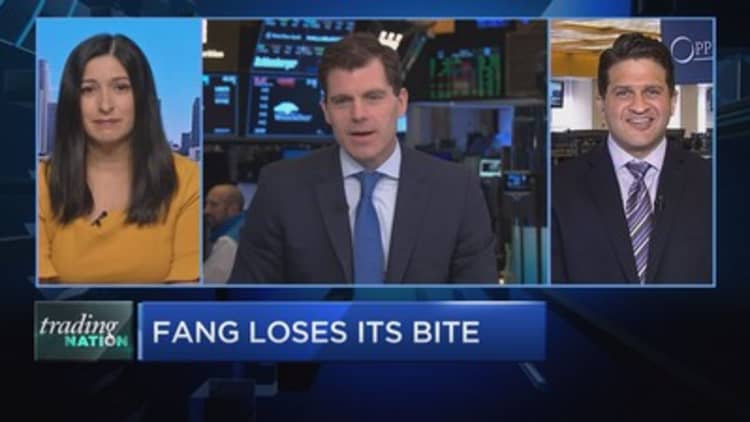
Fears of increased government scrutiny just crushed FANG stocks.
Facebook, Amazon, Netflix and Alphabet tanked Monday, shedding nearly $130 billion in market cap collectively. Those losses sent Facebook, Netflix and Alphabet into a bear market, having dropped at least 20% from recent records.
The drop came on the first trading day after The Wall Street Journal reported that the Justice Department is readying an antitrust investigation against Google over its search practices and other issues. Alphabet declined to comment.
The NYSE Fang+ index, which tracks the big tech companies and a handful of other stocks, could be in for more pain, says Ari Wald, head of technical analysis at Oppenheimer.
"As a group, this particular index has not fared well. If you look at the NYSE Fang+ index -- it's an equal weighted composite of 10 related names, it's the four we know plus stocks like Tesla and Alibaba are in there as well -- it's trading at the same level it first traded at back in December of 2017," Wald said on CNBC's "Trading Nation" on Monday. "It's been a very tough market for this index in what's really been a better environment for high growth in general."
The NYSE Fang+ index tumbled 4% on Monday, and remains just 1% higher for the year. By comparison, high-growth sectors including software, consumer discretionary and communication services have rallied by at least 10%.
"For this particular index, I can say that there's really no signs that this underperformance is abating, and for exposure we prefer software and services. We think that's going to be the part of high growth that outperforms," said Wald.
Gina Sanchez, CEO of Chantico Global, says just the threat of increased regulatory oversight could stymie the FANG trade for some time.
"These companies will be very, very mired in the process of being scrutinized," Sanchez said during the same segment. "They could actually keep these companies so involved in this process over the next two years that they won't be able to effectively run and do the things that growth companies do."
The degree of oversight could mirror the intense antitrust scrutiny given to Microsoft during the 1990s, says Sanchez. The U.S. government accused Microsoft of illegally maintaining a monopoly, a case it won in a 2000 ruling.
"The market response is appropriate given the fact that everybody saw what happened to Microsoft, they had to take their eye off the ball, and so this could be one of those moments," said Sanchez.
Microsoft's stock price was largely unaffected over the course of the case. From the point at which the Department of Justice filed antitrust charges in May 1998 to the April 2000 ruling, Microsoft shares more than doubled.





